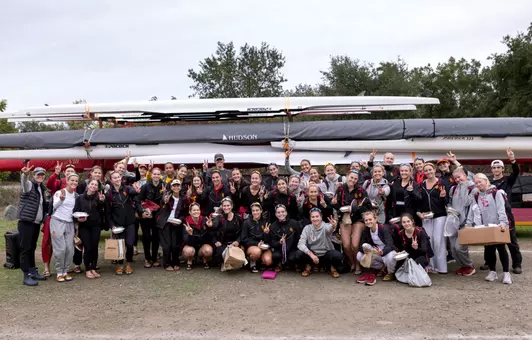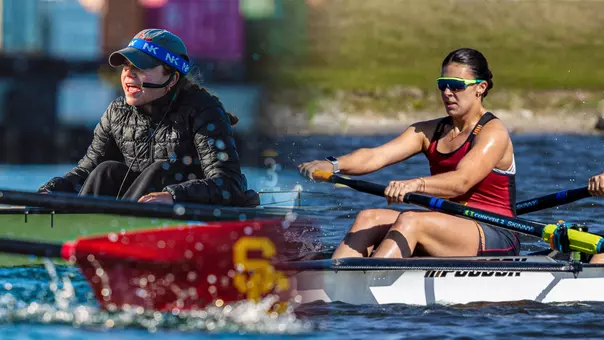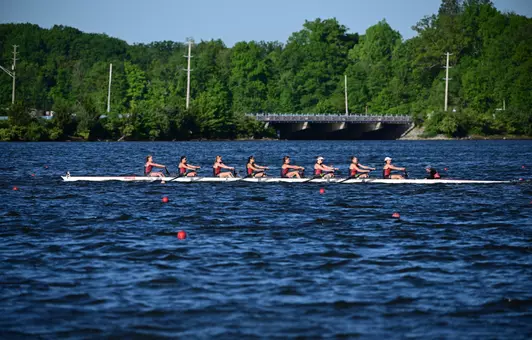University Southern California Trojans
Women's Rowing Season Outlook
June 21, 1999 | Women's Rowing
February 1, 1999
LOS ANGELES - For almost a quarter century, the USC women's rowing team has been competing against some of the best collegiate rowing programs the nation has to offer.
And with the rich athletic heritage at USC, it's kind of fitting that the beginning of a new era in Trojan rowing began with a victory at the NCAA Championships last May.
This year, with that kind of experience under their belts, sixth-year USC head coach George Jenkins expects nothing less than to qualify the entire team to the NCAAs.
"We're pretty convinced that if we have a solid season, we should have one of the top 15 boats," Jenkins said. "The main goal is to try and take the entire team, but it's going to take the varsity eight having a really outstanding performance, the JV eight kind of holding their own and a good performance at the Pac-10s by the four to get the entire team to the NCAAs."
USC is led by a strong group of returning rowers that includes all five members of the varsity four team that won the NCAA championship last season. Coxswain Lisa Bartoli, stroke Ivelina Boteva, bow Rebecca Moneymaker, two-seat Kasey Ryan and three-seat Annelisa Gross will form the core of an experienced, but young, varsity squad that will look for a return to the championships in the spring.
Leading the squad is Boteva, who has already assaulted the record books as a freshman and is one of the strongest rowers on the squad. Her record-setting 1998 freshman year included setting a junior world record for 2,000 meters on an ergometer (6:37.9) at the World Indoor Rowing Championships in Boston.
Boteva brings with her a wealth of experience to the Women of Troy, not only after just one season of rowing at the college level, but also internationally. She was a member of the Bulgarian Junior National team for four years and went on to claim numerous titles at both the Bulgarian and Balkan Championships.
"Ivelina Boteva is a world class rower and is, literally, one of the strongest women in the entire world. She rows at the same level as she pulls," Jenkins said. "She's technically as good as she is physically."
Bartoli, a junior, returns for her second season as a coxswain for USC and has shown dramatic improvement. A good tactician, Bartoli will again prove valuable as an on-the-water coach in 1999 after guiding the varsity four boat to the NCAA title last season.
"Lisa is becoming a good tactician and is very level-headed out there in the middle of very intense boat racing," Jenkins said. "You need a cool customer out there when you have 400 meters to go and you're trying to figure out when you're going to hit the gas for that final sprint."
After a strong off-season training regiment, Moneymaker will look to cement her position in the varsity eight in 1999 as a sophomore.
"Rebecca has made enormous improvement," Jenkins said. "She trained like crazy all summer and came back ready to go and continues to improve."
As one of only four seniors on the team this season, Ryan will be a key component in the Trojans' hopes of returning to the NCAAs.
"Kasey has real raw athletic talent and the more we see her train, the more we see that talent develop," Jenkins said.
Gross, a senior, is in her second year of rowing at USC after spending two seasons up the coast at UC Santa Barbara before transferring in 1997.
"Annelisa is one of those people who was new to the sport of rowing when she got to college, but she has a great deal of physical strength and she brings a lot of horsepower to the boat," Jenkins said.
Other key returnees who Jenkins said have a chance of breaking into one of the varsity boats include a trio of juniors in Amelia White, Tasha Reilly and Amber Buhl. White was a member of the Vanderbilt varsity women's team for more than a season before coming to USC, while Reilly and Buhl will provide much-needed experience in both the varsity and novice eight boats.
However, Jenkins said that the key to qualifying the entire team to the NCAAs will be the progression of the varsity and JV eight boats. The JV boat will be made up of an entirely new crew of transfers, new members to the eight and incoming freshmen.
"The competition to make that varsity boat is going to be fierce. The women all know it and they are all working very hard," Jenkins said. "We are trying to bring people in and get a good core group of people to fill out the JV boat and make it competitive."
With eight scholarships to hand out in the fall, Jenkins added a group of transfers and some talented freshmen to bolster an already strong varsity squad, including freshman Marketa Vochoskova of the Czech Republic, who will help power the varsity eight boat.
A tremendous rower in her own right, Vochoskova was named the Best Rower of the Czech Republic in 1996 and was a member of the Czech Women's National Team and the Czech Junior National Team for five years.
"Marketa will make an immediate impact on this team," Jenkins said. "It's not often that one person can get in the boat and make a big difference, but Marketa is one of those people who we think is going to make a noticeable difference in the speed of the boat."
Other top newcomers include transfers Janece Rittenberry, a senior, and sophomores Kelli Gifford and Suzanne Rosso. Gifford was a member of the first-place boat at both the Berg Cup and San Diego Fall Classic in her freshman season at Orange Coast College, while Rosso was named the Most Improved Rower in her first season at Loyola Marymount.
Freshmen Katie Sadalski and Wes Toppert round out the 1999 newcomers and will add much-needed depth to the JV eight boat.
Already last fall, USC has impressed many with its finishes at prestigious regattas. At the Head of the Charles race in Boston in October, the Women of Troy finished in 11th place out of 59 teams in the women's eight competition. USC was the highest-placing crew from the West Coast and finished sixth among collegiate crews at the event.
"To go that fast was real encouraging for us," Jenkins said. "I think on a given day, especially early, there are not going to be too many crews that we are not going to be able to run with. If we don't get hurt, if we have good water to train on, and we keep up the really intense work dynamic that we have right now, we can really be pretty good."

















